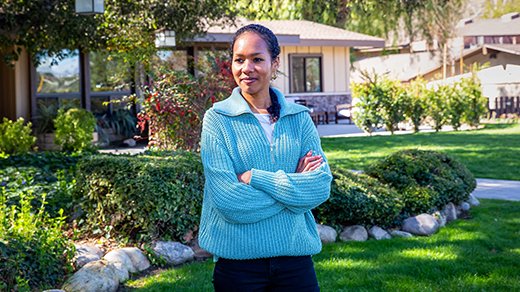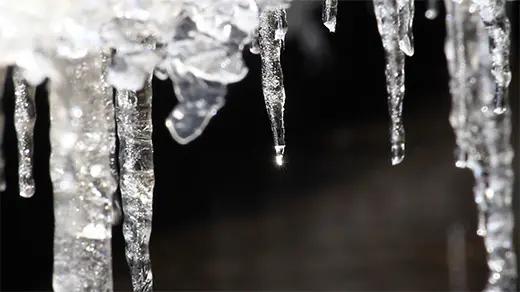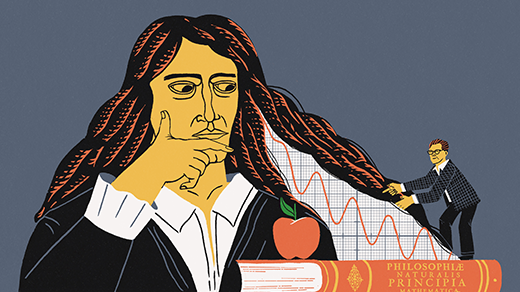A Mathematician Who Fled to Freedom but Still Stares Down Doubts

Svetlana Jitomirskaya on the trails near her home in Irvine, California.
Monica Almeida for Quanta Magazine
Introduction
On paper, it might come as no surprise that Svetlana Jitomirskaya, born in Kharkiv, Ukraine, in 1966, became a mathematician. Everyone in her family — her parents and her older brother — was one. Her mother, Valentina Borok, was particularly well known, as back then she was Ukraine’s only female full professor of mathematics.
But her mother also tried to warn her away from the subject. She thought that Jitomirskaya didn’t have enough raw talent to become a research mathematician — especially as a woman, and especially in the Soviet Union. As Jitomirskaya grew up, she dreamt of studying Russian poetry instead.
She would only start pursuing a career in mathematics as a result of politics and circumstance. In the Soviet Union, any humanities education would inevitably be too enmeshed with Communist ideology. (Even biology and agricultural science were subject to this corruption, with tragic results.) Mathematics seemed blissfully free of that. And so, at age 16, she headed to the prestigious Moscow State University, where she finally fell in love with the subject and obtained both her undergraduate and graduate degrees.
After she completed her doctorate in 1991, she and her husband, a physical chemist, moved to the United States, where she began working as a part-time lecturer at the University of California, Irvine. She quickly advanced. Today, her title at Irvine is distinguished professor, and she was recently named the Hubbard Chair professor at the Georgia Institute of Technology.
Throughout her career, she has been widely recognized for her work on problems in analysis, mathematical physics and dynamical systems, and earlier this year she was awarded the inaugural Olga Alexandrovna Ladyzhenskaya Prize. The prize, announced during the International Congress of Mathematicians around the same time as the Fields Medals, honors groundbreaking work in mathematical physics and related fields. [Editor’s note: The 2022 prize was funded by the Simons Foundation, which also funds this editorially independent magazine. Simons Foundation funding decisions have no influence on our coverage.] Much of Jitomirskaya’s research involves understanding so-called quasi-periodic operators, which model the behavior of electrons in certain environments and are relevant to various phenomena in quantum physics.
Her family’s mathematical legacy also continues through her three adult children, who are all pursuing mathematical careers.
Quanta Magazine spoke with Jitomirskaya about her research, her experiences as a young Jewish woman in the former Soviet Union, and her hopes for math education.
The interview has been condensed and edited for clarity.
Your first love wasn’t math, but literature. Why was that?
When I was a child, I really stood out in language arts, not math. I loved writing and reading poetry. I could read or hear a poem just once or twice and then remember it. I still remember thousands of Russian poems, all learned as a child. By the time I was 9 or 10 years old, my parents noticed that I was reading the literary criticism section in one of their weekly newspapers — the part they would always just throw away.
So I started attending a literature studio led by a famous children’s poet. That was a very, very important part of my childhood. I always felt that the studio helped create my personality and who I am. But after a critique of one of my poems, I became very shy about sharing my poetry. I kind of unlearned to write, but learned to read. I learned to see things in poems that others didn’t.
So poetry was my deepest interest. I didn’t see myself as a future mathematician at all.
Was that unexpected, given that everyone else in your family — your parents, your older brother — was a mathematician?
One of my grade school teachers used to say it was surprising that I didn’t stand out as much in math. But actually, my parents, and especially my mom — she was often the one deciding such things — had an idea that I shouldn’t be a mathematician.
Why not?
They loved me very much, and they wanted my happiness. And my mom probably thought that this would not be a good path to that. All her friends were mathematicians. She was friends with the parents of Vladimir Drinfeld, a child prodigy who could do math at age 6 that really made people’s jaws drop. [Editor’s note: Drinfeld was awarded the Fields Medal in 1990.] She saw what it meant for a child to have talent in math, and she didn’t observe anything close in me. She probably thought that I didn’t have enough talent to be successful — especially as a woman.
So she tried very hard to steer me away from math. She tried to steer me toward becoming a doctor, and when it became clear that I was afraid of the sight of blood, she started bringing me books on psychology. But I was not very interested in that. What I was really interested in was literature.
So then what ultimately drew you to math?
I probably had math talent even as a kid. I don’t know how everyone completely missed it, including me. Well, growing up watching my mom do mathematics, I didn’t even dream that I could become like her. I thought that I didn’t have it in me. I’m not a very fast thinker, and she was very fast. I very much admired her.

Jitomirskaya in her office at the University of California, Irvine.
Monica Almeida for Quanta Magazine
But looking back now, I do see some early signs of interest in math. Every school year when I’d get my new set of math textbooks, the first thing I would do was methodically try to solve all 100 or so challenge problems at the back. I liked to challenge myself. And even though my family discouraged me from math early on, growing up among mathematicians helped me develop a resilience for solving problems. On family hikes and walks, one of our favorite pastimes was solving logic puzzles. When my mom would come up with the problem, she would never give me hints. I remember thinking about some of these puzzles for weeks, returning to the same problems over many walks. Even if it took me a very long time, I would have the satisfaction of having solved it myself.
I decided to study mathematics a bit later, around 9th grade. I was thinking about what to study in university. Studying philology or literature in the Soviet Union wasn’t appealing at all. It was too embedded in ideology. I wouldn’t have been allowed to study the kind of literature I liked, or study my favorite poets without praising the Communist party after every sentence.
I considered studying with a famous literary critic who was working in Estonia instead. But he was a dissident, which made my parents afraid. They were very much against the regime, but quietly so, and they didn’t want the life of a dissident for me. So they talked me out of it.
Mathematics was the next-best thing. And then it was really in university that I started to like it.
At this time, you also had to deal with antisemitism. How did that shape you?
It was my dream to attend Moscow State University. Moscow was the center of everything — of culture, of museums. All my favorite poets were there; the most genius mathematicians were there. And I had another important motivation: During a vacation when I was 14 years old, I met a boy from Moscow. It was love at first sight — he later became my husband.
But applying to Moscow State, the odds were very much against me. They would admit maybe one or two Jews into a class of 500. If the nationality listed on your internal [Soviet] passport said you were Jewish, many doors were closed for you. So I had to hide my Jewish identity. My passport said “Ukrainian” when it should have said I was Jewish. And I lied about my father’s [Jewish] patronymic on my application. I was actually scared during my years in university that it would be discovered, and I would be expelled.
While I was in university, I also got married, and my husband’s name is very obviously Jewish. I knew that with such a husband, I had zero chance of going to grad school. So I hid that I got married from everyone except family and his friends. Even when I became pregnant a couple of years later, I didn’t tell anyone, even though it was considered shameful then to be pregnant without being married.

Soon after leaving the Soviet Union in 1991, Jitomirskaya joined the University of California, Irvine, as a part-time lecturer. She is now a distinguished professor.
Monica Almeida for Quanta Magazine
It was difficult to hide it from all my classmates. I have no friends from my college years that didn’t come from my husband’s side, because I always had this pretty big secret. I couldn’t confide in anyone.
You ended up studying problems in mathematical physics and dynamical systems. What drew you to those areas?
The truth is, before I started doing research in it, I never liked physics. I did well in my physics classes, but never felt like I gained an intuitive understanding of everyday physical events. But when I started working with my Ph.D. adviser, Yakov Sinai, who studied probability, the first paper he gave me to read involved physics. I hated it. But there was no way back. When you start to learn something really deeply, and see some cool mysteries — some of which you help unravel — how can you resist?
How does your work intersect with physics?
I study models that govern the behavior of electrons in different materials and environments — in materials with impurities, for instance, or in moiré materials. Even though many of the questions I study are actually purely mathematical — some of my results involve timescales that are larger than the lifetime of the universe — this area is driven by physics. Physicists keep coming up with important emerging materials that need to be studied, like graphene and other two-dimensional materials. There is a lot of interest in developing models that can describe some of the phenomena you see in those materials.
In particular, I study models that have some interesting special structure, called quasi-periodicity. “Quasi-periodic” means something that locally looks periodic [with repeating behavior], but whose behavior may look chaotic at larger scales. This special structure is very amenable to rigorous analysis, where you can actually obtain the kinds of results I find most beautiful: You can fully describe the model’s behavior as you change each of its parameters.
For example, I am probably most proud of my results on the almost Mathieu operator. This operator is related to the behavior of an electron on a two-dimensional plane in a perpendicular magnetic field. I made progress in studying some of this model’s remarkable phase transitions.
How do you spend your time when you’re not doing math?
For a long time, my main interest was raising my three kids. I also like to hike, bike and especially swim in nature. I swim year-round in the Pacific Ocean, and especially like swimming in cold water — you really get a euphoric sensation out of it — in a beautiful setting, like at sunrise or sunset. And I still read poetry.

Monica Almeida for Quanta Magazine
Your children are all pursuing mathematics, too. Did you hope for that, or were you more wary like your mom was with you?
It’s very nice, but it was not my original intention. When they were little, I personally taught them both Russian literature and math. I guess I did a better job with math. Or maybe it’s intrinsic. It’s hard to say.
Regarding education, you’ve also been critical of proposed changes to the math curriculum in California schools. Why?
I have many problems with the proposed California math framework, especially with how it would de-emphasize algebra and pre-calculus in favor of so-called data science, which would rob students of the ability to ever enter a STEM profession. Gaining a fundamental understanding in all the pre-calculus courses is hugely important. There should be more of that, not less, for those who want to pursue STEM.
That said, I don’t say that I know how to fix American education. But it does need fixing.
Since the invasion of Ukraine, you’ve also spent time trying to help. How so?
This is a huge trauma for every Russian and Ukrainian. Both were my countries. For a while, I just couldn’t manage to think about anything else at all. Since then, I’ve learned to compartmentalize — and math helps, because you tend to get very deeply involved in it and forget about other things. But at first, I just couldn’t do anything else. In March, I was trying to help some friends and their relatives to get out, and got involved in an effort to help evacuate people with medical issues, including Holocaust survivors, from Ukraine. I have also been part of an effort to provide jobs and education for some of the displaced mathematicians.
When did you leave Ukraine?
I came to the United States right after getting my Ph.D. from Moscow State University in 1991. My husband was offered a postdoctoral position in California, and I just decided that I was coming with him. I was basically ready for anything. And I started really, really low. My first job was as a part-time lecturer. It’s probably quite unusual for a major prize winner to have such a trajectory.
Did that affect how you saw yourself as a mathematician?
I definitely underestimated myself very much for a very long time. One reason was probably my parents. [Laughs.] On the one hand, I never felt stress about satisfying their ambitions, because they had very low ambitions for me. But on the other hand, it led to some self-esteem issues. I think I was actually better than they thought of me, and better than how I saw myself.
Another thing is that at first, I was not a very successful graduate student. Even though I’d excelled as an undergraduate, for the first few years after starting research, I just didn’t have results. It wasn’t until later that I realized my adviser was giving me very difficult problems. Probably most people would have dropped out. But somehow I had the resilience to continue, and I actually finished my Ph.D. with a total of seven papers.
Also, perhaps the fact that I started so low has led to some serious respect issues in my own department, something that is not fully gone to this day, despite the outside recognition.
And then, every time I got some recognition, I would suspect that I got it because I’m a woman. Many people think that way, and it’s unpleasant. If they don’t personally know a woman’s research, and they hear she got some award, they’re sure it’s because of her gender.
When did you start thinking differently?
It happened gradually. Only much later I realized that actually, no, I deserved recognition regardless of my gender. Maybe my gender has helped in some ways, but it doesn’t mean that I didn’t deserve it. But I developed a healthier attitude to this only recently.



